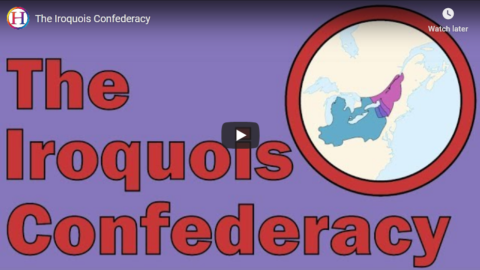The Great War
Published 11 Jul 2020Sign up for Curiosity Stream and get Nebula bundled in: https://curiositystream.com/thegreatwar
The summer of 1920 was marked by escalating tensions on the borders of the German Reich. In the Rhineland, a neutral zone per the Versailles Treaty, the revolutionary uprising after the failed Kapp Putsch was put down with the help of the army and the Freikorps. In Upper Silesia, the conflict between Poland and Germany was escalating into a proxy war. And all that while the German government was negotiating the payments of reparations at the Spa Conference.
» SUPPORT THE CHANNEL
Patreon: https://www.patreon.com/thegreatwar» OUR PODCAST
https://realtimehistory.net/podcast – interviews with World War 1 historians and background info for the show.» BUY OUR SOURCES IN OUR AMAZON STORES
https://realtimehistory.net/amazon *
*Buying via this link supports The Great War (Affiliate-Link)» SOURCES
Buat, Edmond. 8 (Perrin, 2015)
Beaupré, Nicolas. Occuper l’Allemagne après 1918 (Revue historique des armées, 2009)
Böhler, Jochen. Civil War in Central Europe, 1918-1921 (Oxford University Press, 2019)
Gietinger, Klaus. Kapp-Putsch (Stuttgart: Schmetterling, 2020)
le Naour, Jean Yves. La Honte Noire (Hachette, 2004)
Le Figaro, numéro du 8 avril 1920 (via Gallica)
Stengers, Jean. L’accord militaire franco-belge de 1920 et le Luxembourg (Revue belge de de Philologie et d’Histoire, 2004)
https://www.dhm.de/lemo/jahreschronik…
Pöppinghege, Rainer: Republik im Bürgerkrieg. Kapp-Putsch und Gegenbewegung an Ruhr und Lippe 1919/1920 (2019)
van Galen Last, Dick. Des soldats noirs dans une guerre de blancs (1914-1922): une histoire mondiale (Editions de l’Université de Bruxelles, 2015)» MORE THE GREAT WAR
Website: https://realtimehistory.net
Instagram: https://instagram.com/the_great_war
Twitter: https://twitter.com/WW1_Series
Reddit: https://reddit.com/r/TheGreatWarChannel»CREDITS
Presented by: Jesse Alexander
Written by: Jesse Alexander
Director: Toni Steller & Florian Wittig
Director of Photography: Toni Steller
Sound: Toni Steller
Editing: Toni Steller
Motion Design: Philipp Appelt
Mixing, Mastering & Sound Design: http://above-zero.com
Maps: Daniel Kogosov (https://www.patreon.com/Zalezsky)
Research by: Jesse Alexander
Fact checking: Florian WittigChannel Design: Alexander Clark
Original Logo: David van StepholdContains licensed material by getty images
All rights reserved – Real Time History GmbH 2020
July 13, 2020
German-Polish Proxy War In Silesia – French Troops On The Rhine I THE GREAT WAR 1920
“The Richard of Richard III is often regarded as a caricature, a cardboard-cutout villain rather like the Sweeney Todd of Victorian melodrama”
Theodore Dalrymple discusses two Shakespeare characters, the protagonists of Richard II and Richard III:

This was long thought to be the only portrait of William Shakespeare that had any claim to have been painted from life, until another possible life portrait, the Cobbe portrait, was revealed in 2009. The portrait is known as the “Chandos portrait” after a previous owner, James Brydges, 1st Duke of Chandos. It was the first portrait to be acquired by the National Portrait Gallery in 1856. The artist may be by a painter called John Taylor who was an important member of the Painter-Stainers’ Company.
National Portrait Gallery image via Wikimedia Commons.
… if we cannot know Shakespeare’s positive thoughts about any major question, as Nutall puts it, we can at least surmise some of the things that he did not believe. No one, I think, could imagine that Shakespeare romanticized the common man or was impressed by a crowd’s capacity for deep reflection. If there is one thing that he was not, it is a utopian.
Apart from the absence of direct evidence, one reason that it is so difficult to know what Shakespeare thought is that he seemed uniquely able to imagine himself into the minds of an almost infinite number of characters, so that he actually became them. He was, in a sense, like an actor who has played so many parts that he no longer has a personality of his own. A chameleon has many colors, but no color. What is perhaps even more remarkable is that, by some verbal alchemy, Shakespeare turns us into a pale version of himself. Through the great speeches or dialogues, we, too, enter a character’s world, or even become that character in our minds. I know of no other writer able to do this so often and across so wide a spectrum of humanity.
Included in this spectrum are the two King Richards, the Second and the Third. Shakespeare wrote the two plays in reverse historical order, about four years apart. The usurpation of Richard II’s throne in 1399 by Henry Bolingbroke, Henry IV, led to political instability and civil war in England that lasted until the death of Richard III in battle in 1485. Because everyone loves an unmitigated villain, Richard III is said to be the most frequently performed of all Shakespeare’s plays, but its historical verisimilitude is much disputed. It is clearly an apologia for the Tudor dynasty, for if Richard III were not the absolute villain he is portrayed as having been (and such is the power of Shakespeare’s play that everyone’s image of the king, except for those specially interested, derives from it), then Henry VII, whose dynastic claims to the throne were meager, to say the least, was not legitimately king — in which case neither was Henry VIII, Queen Elizabeth’s father, nor, therefore, was Queen Elizabeth legitimately queen: a dangerous proposition at the time Shakespeare wrote. So reminiscent of sycophantic Soviet historical apologetics does a Soviet emigré friend of mine find the play that he detests it. In 1924, a surgeon in Liverpool, Samuel Saxon Barton, founded what became the Richard III Society, which now has several thousand members globally, to rescue the reputation of the king from the Bard’s calumnies.
If Richard III were merely a propaganda play on behalf of the Tudors, however, it would hardly have held its place in the repertoire. It does so because it tackles the perennially fascinating, and vitally important, question of evil in the most dramatic manner imaginable; its historical inaccuracy does not matter. Richard III may not have been the dark figure Shakespeare portrays, but who would dare to say that no such figure could ever have existed?
The two plays offer a contrast between different political pathologies: that of ambitious malignity and that of arrogant entitlement, both with disastrous results, and neither completely unknown in our time. They share one rather surprising thing in common, however: before reaching the throne, both usurpers — Richard III, when still Duke of Gloucester; and Henry IV, when still Duke of Hereford — felt obliged to solicit the good opinion of the common people. This is perhaps surprising, in view of the extremely hierarchical nature of society in both the age depicted in the plays and the age in which they were written, and suggests a nascent populism, if not real democracy. However powerful the king or nobility, the Peasants’ Revolt of 1381, early in the reign of Richard II (as much a revolt of merchants as of peasants), must have alerted them to the need to keep the populace at least minimally satisfied.
Update: Fixed broken link and mis-placed image.
What if a Fool Has the Launch Codes? | The Cuban Missile Crisis I Day 06
TimeGhost History
Published 12 Jul 2020On October 21 1962, politicians and military in both the US and in the USSR seem to have contradictory views on what to do next. Should the Soviet local commanders on Cuba get to play with the little nukes as they like, or rather wait for permission?
Join us on Patreon: https://www.patreon.com/TimeGhostHistory
Hosted by: Indy Neidell
Written by: Spartacus Olsson
Director: Astrid Deinhard
Producers: Astrid Deinhard and Spartacus Olsson
Executive Producers: Astrid Deinhard, Indy Neidell, Spartacus Olsson, Bodo Rittenauer
Creative Producer: Joram Appel
Post-Production Director: Wieke Kapteijns
Research by: Spartacus Olsson
Edited by: Daniel Weiss
Sound design: Marek KaminskiColorizations:
– Carlos Ortega Pereira (BlauColorizations) – https://www.instagram.com/blaucoloriz…
– Daniel WeissSources:
From the Noun Project:
Arm Sling By Sergey Demushkin
Death by Adrien CoquetSoundtracks from Epidemic Sound:
– “Cold Eyes” – Elliot Holmes
– “Zoot Suit” – Elliot Holmes
– “From the Depths” – Walt Adams
– “Kissed by Thunder” – Elliot Holmes
– “Car Chase in Virginia” – White Bones
– “When They Fell” – Wendel SchererArchive by Screenocean/Reuters https://www.screenocean.com.
A TimeGhost chronological documentary produced by OnLion Entertainment GmbH.
Sarah Hoyt on noblesse oblige
In the latest edition of the Libertarian Enterprise, Sarah Hoyt explains how noblesse oblige can and is used as a tool to benefit the powerful:
Of all the traps a culture can fall into, the fact that Americans tend to fall into Noblesse Oblige traps says very good things about us. It also doesn’t make the trap any less dangerous.
Noblesse Oblige, aka “nobility obligates” was a way that the excesses of a hierarchical society was kept in check. While the peasants were obligated to obey the nobleman, the nobleman was obligated to look after them/not put extreme demands on them/behave in certain paternalistic ways. (One of these days I need to do a post on paternalistic versus patriarchal. remind me.)
It is what is notably lacking from ideologically driven totalitarianisms and hierarchies, probably because their basis being atheistic they don’t seem the humans they have power over as being worth anything or commanding any duty from them. This is why in places like Cuba, Venezuela or China, the officials of the “democratic” government give themselves airs as long-suffering public servants while treating the people under their power worse than any of us would treat a stray animal (let alone a pet.)
In the US — where the citizen is king! — we have evolved a form of noblesse oblige best described as “Them who can, do what they can for those who can’t.”
[…]
But the noblesse oblige that affects the common individual in America is the foundation of worse traps.
Most of the idiotic compliance with ridiculous Winnie the Flu rules and restrictions hooked directly into Noblesse Oblige. For instance, the brilliant idea that you should wear masks to show you care even though we pretty much know they are completely ineffective and quite deleterious for a vast swath of people.
The idea that our kids should be forced to perform “volunteer” labor to graduate school, to “teach them to care for others.” The idea that you can always do a little more/sacrifice a little more for “those worse off” (Who often aren’t.)
When Noblesse Oblige turns into toxic altruism, it can take society apart.
Much of the “Green” mania is part of the noblesse oblige trap. They’re trying to convince us that if we just do these little things — most of them counterproductive, like, say recycling, which uses more resources and causes more issues than just using stuff — we’ll make it better for everyone.
In a bigger sense, they’re trying to make it so that we commit polite suicide so that “others live better.”
It can result in truly horrible racism, too. A great part of the left’s being convinced, say, that meritocracy is white supremacy comes from the fact that, being white, (and racist) they assume that they’re more competent than any other race, and therefore following “merit” causes white people to rise to the top.
The Iroquois Confederacy
Historia Civilis
Published 20 Jun 2018Patreon | http://patreon.com/HistoriaCivilis
Donate | http://www.paypal.com/cgi-bin/webscr?…
Merch | http://teespring.com/stores/historiac…
Twitter | http://twitter.com/HistoriaCivilis
Website | http://historiacivilis.comSources:
“Discourse Delivered Before the New-York Historical Society: At Their Anniversary meeting, 6th December, 1811,” by DeWitt Clinton: https://amzn.to/2JJZ7eB
The Great Law and the Longhouse: A Political History of the Iroquois Confederacy, by William N. Fenton: https://amzn.to/2JKVTYo
League of the Hodenosaunee or Iroquois, by Lewis H. Morgan: https://amzn.to/2MzRfue
Forgotten Founders, by Bruce E. Johansen: https://amzn.to/2Mz8VGf
French-Iroquois Diplomatic and Military Relations 1609-1701, by Robert A. Goldstein: https://amzn.to/2JLjfxdMusic:
“Deluge,” by Cellophane Sam
“Hallon,” by Christian BjoerklundWe are a participant in the Amazon Services LLC Associates Program, an affiliate advertising program designed to provide a means for us to earn fees by linking to Amazon.com and affiliated sites.
QotD: Anti-semitism
… if anti-semitism was “only about Jews” it would still matter. Jews matter not because they are Jews, but because they are human. No different qualification is required. That anyone thinks a better qualification than being a human is required to enjoy particular human rights is precisely what is wrong with our society today. Every time someone speaks of “Gay Rights” or “Women’s Rights” or “Black Rights” or “Muslim Rights” or uses the phrase “hate crimes” I am immediately on my guard. Such people are more than likely to be a threat to human rights in general.
Damn it, how often does this need to be said before tribalists stop blathering? The whole point of the post-Enlightenment West is that every individual matters, regardless of who they are. Not just anti-semitism but tribalism in general is the virus that, as Rabbi Sacks says, keeps mutating. The only valid reason to regard an individual as better or worse is, as Dr King famously said (but as the Left seems to have forgotten) “the content of his character.” The only valid reason to treat an individual differently before the law is his or her conduct.
Tom Paine, “What Is It About The Jews?”, The Last Ditch, 2018-04-12.







